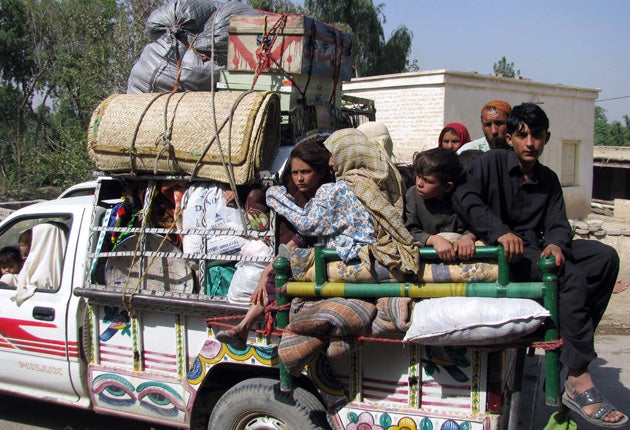Taliban digs in for border battle

Your support helps us to tell the story
From reproductive rights to climate change to Big Tech, The Independent is on the ground when the story is developing. Whether it's investigating the financials of Elon Musk's pro-Trump PAC or producing our latest documentary, 'The A Word', which shines a light on the American women fighting for reproductive rights, we know how important it is to parse out the facts from the messaging.
At such a critical moment in US history, we need reporters on the ground. Your donation allows us to keep sending journalists to speak to both sides of the story.
The Independent is trusted by Americans across the entire political spectrum. And unlike many other quality news outlets, we choose not to lock Americans out of our reporting and analysis with paywalls. We believe quality journalism should be available to everyone, paid for by those who can afford it.
Your support makes all the difference.Pakistani troops were yesterday pushing deeper into South Waziristan on the Afghan border in what is being described as Pakistan's most important operation for a decade, but Taliban fighters were said to be putting up tough resistance.
As the 30,000-strong force pressed further into militant territory on the third day of their operation to crush Taliban and al-Qa'ida fighters, senior military officials claimed progress was steady but admitted it was not rapid. They said 78 militants had been killed, for the cost of two soldiers.
Few details have emerged of an operation regarded both in Pakistan and beyond as critically important, with the military enforcing a media blackout in the area, even cutting off phones. Independent verification of the army's claims was impossible.
But yesterday senior officials revealed that the army is differentiating between "good" militants and "bad", and has reached agreements with "good" militants not to get involved in the battle as troops focus on attacking fighters formerly loyal to Baitullah Mehsud, the Taliban commander killed by a US drone strike this summer.
"Good" militants, for Pakistan, are those who limit their attacks to neighbouring Afghanistan as opposed to those behind the recent barrage of suicide attacks and assaults inside Pakistan. The military has entered into verbal non-aggression pacts with militant leaders such as Maulvi Nazir and Hafiz Gul Bahadur to ensure they remain neutral. Chief military spokesman Major General Athar Abbas said there was an understanding they would not get involved.
"There is always a strategy to isolate your main target," he told reporters in Islamabad. "Sometimes we have to talk to the devil in this regard." Asked if the agreement was holding, he said: "Obviously, they are not coming to rescue or to help."
Mr Abbas also gave the first details of the army's progress: he claimed they had taken the heights around Kotkai, hometown of Qari Hussain, often described in Pakistan as the "godfather" of suicide bombers, having trained hundreds of young recruits to stage terrorist attacks across the country. Two large ammunition depots used by the militants were also blown up, he said.
But as they advanced north-east from the town of Jandola on the edge of South Waziristan, Pakistani troops encountered stiff resistance and sustained rocket fire, he said. After overcoming heavy fighting at the village of Sherwangi, the troops were able to consolidate their positions.
With their focus on up to 10,000 fighters from the Mehsud clan and perhaps 1,000 foreign militants, mainly from central Asia, the army's main thrust is into the stronghold areas of Ladha and Makeen. Yet as soldiers moved forward, they came under a barrage of rocket fire from the Shakai Fort on one front and Makeen on the other.
The operation in South Waziristan is the fourth attempt to crush militants based in the tribal area since 2001. In previous operations the army had made progress but then had been brought to a halt. Peace deals were signed and militants were eventually allowed to regroup and even expand their influence. Experts say the question everyone is now asking is whether the army will this time be willing and able to complete the task.
The ground offensive has sparked a rush of civilians towards the neighbouring towns of Dera Ismail Khan and Bhakkar. An estimated 14,500 families have evacuated the area, said Information minister Qamar Zaman Kaira, though most of those left in the summer when the operation was first mooted. Humanitarian workers say they do not expect to see the flood of refugees that followed the operation to drive militants from the Swat Valley earlier this year when up to 2.5 million people left their homes.
Rasul Bakhsh Rais, a political analyst based in Lahore, said the recent wave of militant attacks, apparently carried out in anticipation of the military operation, "have strengthened the resolve of the people, who now want to get rid of the militants".
Subscribe to Independent Premium to bookmark this article
Want to bookmark your favourite articles and stories to read or reference later? Start your Independent Premium subscription today.
Join our commenting forum
Join thought-provoking conversations, follow other Independent readers and see their replies
Comments